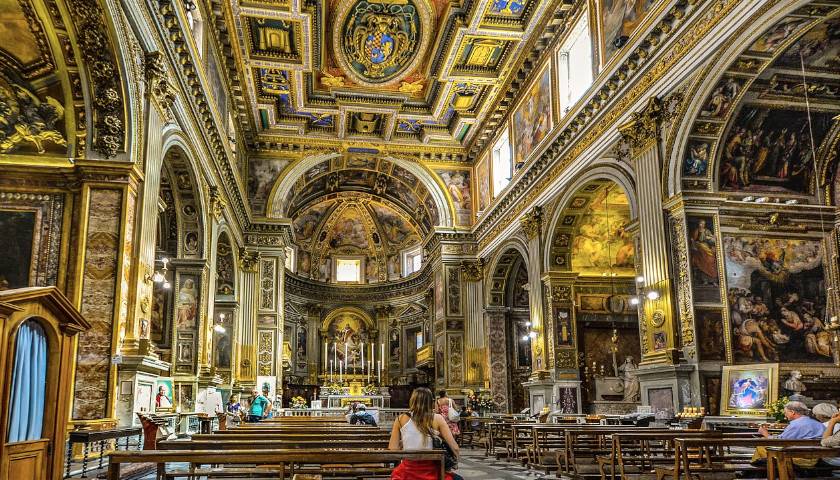by Simon Maass
We’ve all heard the rhetorical attacks on Western Civilization—often centered on Christianity, capitalism, or colonialism, and often on all three. Among radical leftists, the consensus is that these elements are evil, but given that each is currently or historically integral to civilization as we know it, it’s worth examining the data to determine whether they deserve to be so despised.
First, Christianity. A 2018 study found that religion was “the decisive background factor” determining how much human rights were respected in any given country. And not all religions had the same impact. The percentage of Christians in the population was closely associated with a nation upholding human rights, whereas the percentage of Muslims was the opposite—that is, Muslim countries were less likely to uphold such rights. Another study reached similar conclusions about the effects of Christianity vis-à-vis Islam on nations’ ranking in the Good Country Index. (The index measures countries’ “contributions to global prosperity in domains such as peace, climate and health.”)
Additionally, in his classic work The Unbound Prometheus, economic historian David Landes writes that Europe became exceptionally prosperous in large part due to its “rationality.” According to Landes, this distinctive European rationalism may have first appeared in a religious context, exemplified by the “strong tendency in the Judaic tradition to eliminate magic and superstition as a senseless degradation of faith,” a tendency later adopted by Christianity. Thus, our Judeo-Christian background emerges in Landes’ analysis as a key reason for the success of Western Civilization.
The crusades are often considered a black mark on Christianity’s track record. But contrary to popular belief, the crusades were defensive wars. Even an article in the leftist HuffPost essentially admits as much. “The crusades were,” explains author Jay Rubenstein, “the first attempt to reverse [a] centuries-long history of [Islamic] aggression.” He then tries to talk his way around the inevitable conclusion by claiming that the crusaders themselves did not see their fight as defensive. Yet even Rubenstein acknowledges that the Byzantine emperor Alexius I (whose plea for help defending his realm from Muslim incursion led the Church to launch its first crusade) did view the campaign as “a defensive war.”
Another core part of Western Civilization is capitalism. This economic system is often blamed for creating immense human suffering. Yet whatever damage it has caused pales in comparison to its blessings. Economist Hendrik van den Berg writes that worldwide real GDP per capita has “increased nearly ninefold” since 1820. “In the most capitalistic countries,” however, it has grown “twenty-fold or more” over the same period. Strikingly, before the 19th century, this growth was almost non-existent.
Critics have suggested that capitalism arose in Europe because Europeans had amassed enough wealth through imperialism to make the transition possible. Thus, the reasoning goes, it was the West’s exploitation of other peoples, not its unique culture or superior institutions, that created the modern economy. Such interpretations of history tend to focus on those European powers that ruled empires, especially Great Britain. But as sociologist John Hall has argued, “Europe as a whole rose to world power,” not just those nations with colonial states. Therefore, the claim that the West’s economic flourishing stems from colonialism is dubious.
Regardless of how capitalism began, it can now be applied just about anywhere with similar benefits. In an article titled “National Prosperity Is No Mystery,” economist Alan Reynolds compares famous “economic miracles” from the 20th century. He argues that “all successful economies” share certain capitalistic features, including privatization, “secure property rights,” and unrestricted “wages, prices, and interest rates.” The African nation of Botswana is one example, and Reynolds notes that its “economic growth has long been the fastest in the world.” It can hardly be argued that Botswana’s prosperity came from pillaging colonies.
And speaking of colonialism, the West’s history of imperial conquest is also frequently presented as a grievous sin of which we should be ashamed. Yet Westerners brought major benefits to the territories they colonized. Economist Trung Vu calculates that European states tend to be more politically stable the older they are. In contrast, non-European states are less stable the older they are.
What could cause this discrepancy? Vu’s explanation is that when nations outside Europe had longer histories of independent statehood, colonizers were less able to impose European political institutions on them. Such institutions “would eventually become central to shaping countries’ ability to establish politically stable regimes outside Europe.” In other words, societies seem to run less smoothly the less they are shaped by Western Civilization. That alone points to a more balanced view of colonialism.
After years of this sentiment of Western guilt, it’s time to remember the roots of Western Civilization and celebrate the positive legacy of Western culture.
– – –
Simon Maass is a contributor to Intellecutal Takeout.




